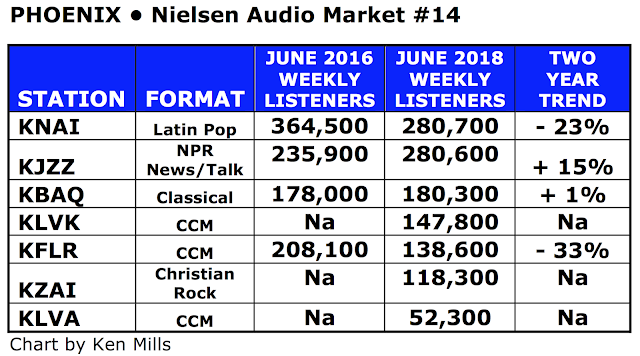 |
| Annie Russell |
You
may have heard that Current pulled
the plug on their three-year old podcast The
Pub. The reason was simple: It was losing money and there was no hope it
would ever become sustainable.
Host
Annie Russell laid it on the line in the first minute of the last episode of The Pub:
This is the last episode
of The Pub – the podcast for people in public media. We know so many of you
tune into the pub regularly and you rely on us.
So, we want to level with you. The podcast didn’t draw enough
underwriting support to cover the production costs. In fact, in the few years
that Current has produced and distributed the pub has only been able to draw
about a quarter of the cost. Unfortunately, the podcast is not sustainable.
Current can’t afford a project
that drains money from its core operations. In July 2017 we reported [link]
about Current’s need to become
self-supporting. To help pay the bills, the publication established a paywall. For
most of its 30+ years covering public media, Current’s budget has been subsidized. Though funding from the Wyncote
Foundation is continuing, it is not forever.
When
The Pub began in early 2015, we were
excited about it. In February 2015 [link] we praised the show, calling it a magazine program that is timely and
provides a valuable mirror of public media. The Pub provides smart criticism of
a business that sometimes takes itself too seriously.
 |
| Adam Ragusea |
Much
of our praise in 2015 focused on host Adam Ragusea, who deserves credit for
making The Pub a reality. Ragusea is a
smart reporter who likes to go to the source of a story. When The Pub broke news (which it sometimes
did), Ragusea interviewed the main players in the story. His style was upbeat
and often irreverent.
We
tuned into The Pub fairly often back
then. We particularly liked his
knowledge about how public radio and TV operated internally. Though we have never
met Ragusea in person, whenever we heard his voice on The Pub, he seemed like trusted friend.
After
Ragusea left for other opportunities, The
Pub seemed to be rudderless and increasingly irrelevant. You can hear that in the final edition of the
show. The Pub was no longer a valuable mirror of public media.
Instead, it became a gabfest that sorely needed an edit.
The
final episode of The Pub was promoted
as “lessons learned.” We anticipated it would include interviews with Julie
Drizin, the Executive Director who green-lighted the show, and Mike Janssen, Current’s digital editor who supervised The Pub on a day-to-day basis. That
would have been interesting.
Host
Annie Russell devoted the entire final show to an interview with a friend whose
podcast also failed. The Pub started
with lofty goals and by the end, devolved into chit chat.
But
don’t blame Russell for the demise for The
Pub. If Ragusea had stayed, the fate of The
Pub would have been the same. The Pub
failed because it wasn’t financially sustainable.
KEN SAYS: The economics of
reporting about public broadcasting aren’t encouraging. The number of people working
in public broadcasting falls below the critical mass needed to justify
advertising buyers. The need for coverage is there but the lack of resources to
do the coverage is apparent.
When
The Pub began, we thought seriously about
also starting a podcast. Then we ran the numbers and saw doing a podcast was a
big risk.
Spark News continues because it is
a service to the public media community.
We realize it will never become a source of major revenue. Our goal for Spark News is to influence policy. We believe
if public radio is to survive and grow, people in the industry must insist on
high standards for content and engagement.
NIELSEN AUDIO JUNE PPM
RATINGS & TWO-YEAR TRENDS
Sometimes
we smile when we see the latest ratings.
This is true of Nielsen Audio June 2018 PPM results.
Three fine stations, NPR News/Talk WUWM,
Wisconsin Public Radio’s talker WHAD and spunky Triple A WYMS all had
outstanding performances.
But
wait, there is more. WYMS’s second station, the Milwaukee Music channel made a
strong appearance even though it is only available on a HD channel and online streaming. It proves if you have essential content, people will find you.
Controversial
KNAI will soon vanish from the noncommercial ratings.
KNAI's licensee, the Cesar
Chavez Foundation, just bought a commercial frequency in Phoenix and KNAI will become a
commercial station...which it already was, anyway.
The
folks at KANU in Lawrence need to consider ending the dual format.
Nice to see The Bridge moving up.






WJYI is a commercial station owned by Sega Communications. Their is a K-Love affilate in the market WLVE 105.9.
ReplyDelete